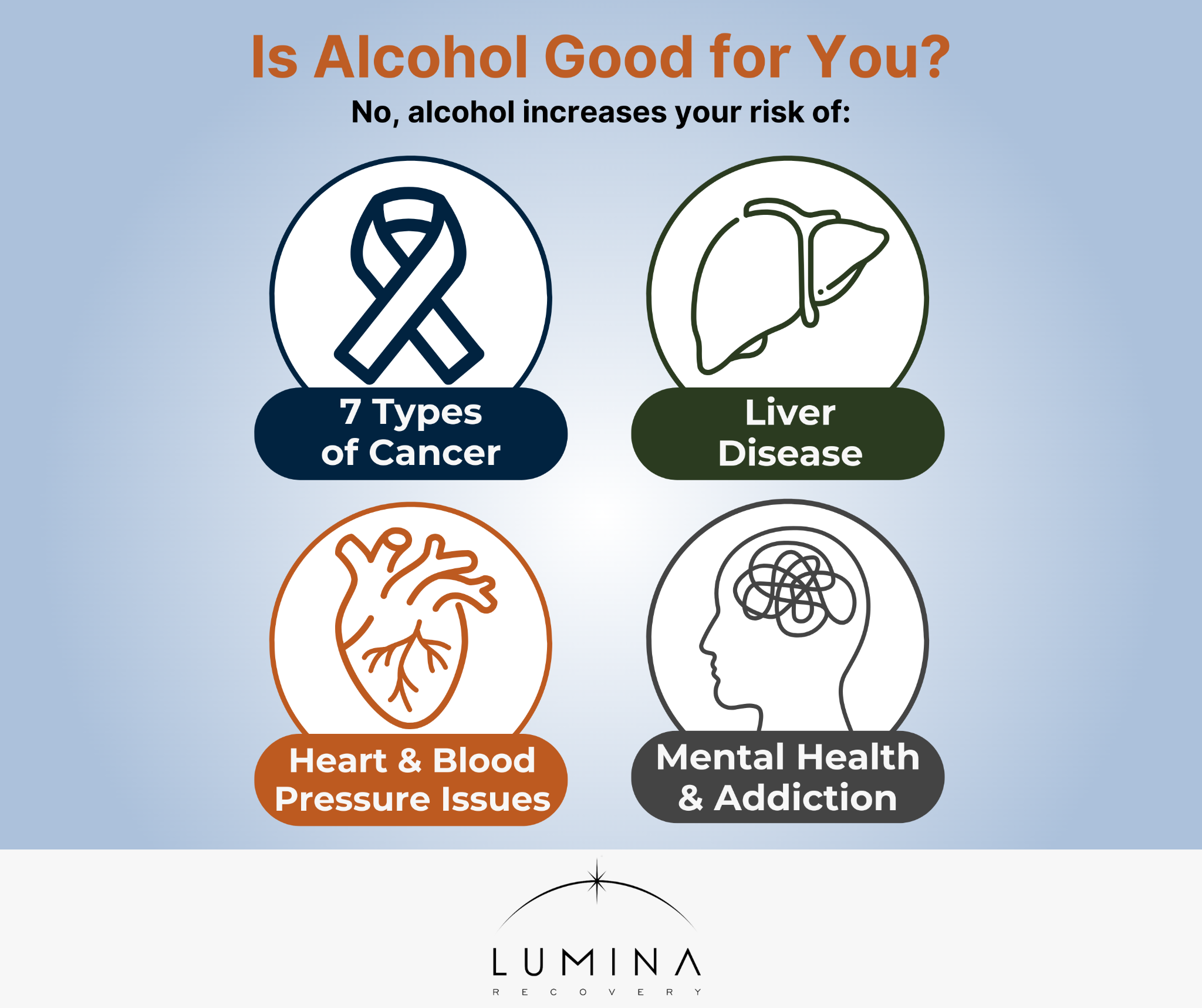No, alcohol is not good for you. Despite widespread claims that moderate drinking, especially red wine, offers health benefits, scientific evidence shows that drinking alcohol increases the risk of liver disease, high blood pressure, cancer, and other long-term health problems.
In reality, major health organizations, including the Centers for Disease Control and Prevention (CDC) and the World Health Organization (WHO), emphasize that no level of alcohol consumption is risk-free.1,2
Below, we’ll break down the myths surrounding alcohol’s benefits, explain the real health risks, and offer safer alternatives for well-being.
The Origins of the “Alcohol Is Healthy” Myth
The idea that moderate drinking is good for you became popular due to several key factors:
- Observational Studies: Many early studies found a correlation between people who drink alcohol moderately and better health outcomes. However, newer research highlights significant flaws in these studies, including selection bias, failure to control for lifestyle factors, and publication bias.3
- Media Influence: News outlets often promote sensational headlines about the supposed benefits of red wine, while downplaying the dangers of alcohol.
- Industry Funding: The alcohol industry has invested heavily in research that highlights potential benefits while ignoring negative effects.4
- The Mediterranean Diet Association: Many assume that red wine is the reason for the long lifespan of people in Mediterranean countries. However, their diet rich in fruits, vegetables, fish, and olive oil plays a much bigger role than alcohol.
Despite these claims, evidence now shows that no amount of alcohol consumption is truly safe for health.
Breaking Down the Claims: Does Alcohol Actually Have Health Benefits?
1. Does Moderate Drinking Reduce the Risk of Heart Disease?
The American Heart Association (AHA) states that consuming one to two drinks a day for men and one drink for women may have protective effects on the heart and blood vessels. In the United States, a standard drink is defined as 12 ounces of beer, 5 ounces of wine, or 1.5 ounces of liquor.5
A 2022 study found that after adjusting for lifestyle factors, the supposed heart benefits of alcohol disappeared.6 Many men and women who consume small amounts of alcohol also tend to follow healthier diets, exercise regularly, and have access to better healthcare, which may explain the lower rates of heart disease rather than the alcohol itself.
2. Does Alcohol Help You Live Longer?
A comprehensive 2023 meta-analysis involving over 4.8 million participants assessed the relationship between alcohol consumption and all-cause mortality. The findings revealed that low-volume alcohol consumption was not significantly associated with all-cause mortality risk. However, consumption at higher levels was associated with an increased risk of all-cause mortality.7
3. Does Alcohol Protect Against Dementia?
Recent research challenges the claim that alcohol consumption protects against dementia. A 2024 study investigated the relationship between alcohol intake and dementia risk. The findings indicated that higher alcohol consumption is associated with an increased risk of developing dementia.8
This study underscores that, contrary to previous beliefs, alcohol consumption does not safeguard against cognitive decline. Instead, it may elevate the risk of dementia.
4. Does Alcohol Improve Metabolic Health?
Research shows that alcohol consumption harms metabolic health. A 2024 study explored the relationship between alcohol intake and metabolic dysfunction.9
The findings suggest that alcohol consumption negatively affects metabolic health by disrupting lipid and glucose metabolism, leading to conditions such as insulin resistance, fatty liver disease, and an increased risk of type 2 diabetes.9
The Hidden Risks of Moderate Drinking
Even moderate drinking comes with serious health risks, including:
Cancer Risks
- Alcohol is classified as a Group 1 carcinogen, meaning it is a known cause of cancer.2
- Alcohol increases the risk of breast cancer in women and is linked to at least seven other types of cancer, including liver, bowel, mouth, throat, colon, and esophageal cancer.2
Liver Disease
- The liver processes alcohol, but even moderate drinking can lead to fatty liver disease and inflammation.9
- Over time, alcohol use can lead to cirrhosis, a severe form of liver disease.9
Heart and Blood Pressure Issues
- Alcohol consumption increases high blood pressure, raising the risk of heart disease and stroke.6
- Heavy drinking is a major risk factor for heart failure and atrial fibrillation.6
Mental Health and Addiction
- Alcohol contributes to anxiety, depression, and sleep disturbances.
- Regular drinking can lead to tolerance, making people consume more over time and increasing the risk of addiction.
What About Red Wine? Are There Unique Health Benefits?
Many people believe that red wine is a healthy choice due to its polyphenol content. While red wine contains polyphenols like resveratrol, the amounts are too small to provide meaningful health benefits.5
Despite its association with wine culture and relaxation, any potential benefits of red wine are outweighed by its negative effects, including an increased risk of liver disease, high blood pressure, and cancer.5
Healthier Alternatives to Alcohol for Heart and Brain Health
Instead of relying on moderate drinking for health benefits, consider these alternatives:
- Whole Foods Rich in Polyphenols: Eat berries, nuts, dark chocolate, and drink herbal teas.
- Exercise and Stress Management: Regular physical activity and mindfulness practices lower the risk of heart disease without the dangers of alcohol.
- Better Social and Psychological Well-Being: Develop healthy coping mechanisms, such as meditation, therapy, and supportive relationships.
- Beverage Alternatives That Support Health: Try green tea for brain health, pomegranate juice for heart benefits, kombucha for gut health, and mocktails for an alcohol-free option.
FAQs
Is red wine good for you?
No. While red wine contains some antioxidants, the health risks of drinking alcohol outweigh any potential benefits.
How much alcohol is safe?
According to the World Health Organization (WHO), no amount of alcohol is truly safe for health.2
Does moderate drinking prevent heart disease?
No. New research shows that alcohol increases the risk of heart disease and does not provide meaningful heart benefits.5
How much alcohol is healthy?
There is no truly “healthy” amount of alcohol. Even small amounts of alcohol have been linked to an increased risk of cancer, high blood pressure, and liver disease. The CDC and WHO state that the safest level of alcohol consumption is none.1,2
Choose a Healthier Path With Lumina Recovery
The idea that moderate drinking is beneficial is a myth. Observational studies linking red wine and other alcohol to health benefits fail to account for other lifestyle factors. The truth is that drinking alcohol carries significant risks, including liver disease, cancer, high blood pressure, and mental health disorders.
If you or a loved one are struggling with alcohol use, Lumina Recovery offers a holistic alcohol addiction program to help individuals break free from alcohol dependence and regain control of their health. We also provide dual diagnosis treatment, addressing both substance use and co-occurring mental health conditions for a holistic approach to recovery.
Take control of your health today and contact Lumina Recovery for expert addiction treatment and support.
Sources:
- CDC. About Moderate Alcohol Use.
- WHO. No level of alcohol consumption is safe for our health.
- Stockwell T, Zhao J, Clay J, et al. Why Do Only Some Cohort Studies Find Health Benefits From Low-Volume Alcohol Use? A Systematic Review and Meta-Analysis of Study Characteristics That May Bias Mortality Risk Estimates. J Stud Alcohol Drugs. 2024 Jul;85(4):441-452. doi: 10.15288/jsad.23-00283.
- WebMD. Is Wine Really Good for You?
- Biddinger KJ, Emdin CA, Haas ME, et al. Association of Habitual Alcohol Intake With Risk of Cardiovascular Disease. JAMA Netw Open. 2022 Mar 1;5(3):e223849. doi: 10.1001/jamanetworkopen.2022.3849.
- Zhao J, Stockwell T, Naimi T, et al. Association Between Daily Alcohol Intake and Risk of All-Cause Mortality: A Systematic Review and Meta-analyses. JAMA Netw Open. 2023 Mar 1;6(3):e236185. doi: 10.1001/jamanetworkopen.2023.6185.
- Zheng L, Liao W, Luo S, et al. Association between alcohol consumption and incidence of dementia in current drinkers: linear and non-linear mendelian randomization analysis. EClinicalMedicine. 2024 Sep 5;76:102810. doi: 10.1016/j.eclinm.2024.102810.
- Genchi VA, Cignarelli A, Sansone A, et al. Understanding the Role of Alcohol in Metabolic Dysfunction and Male Infertility. Metabolites. 2024 Nov 15;14(11):626. doi: 10.3390/metabo14110626.




